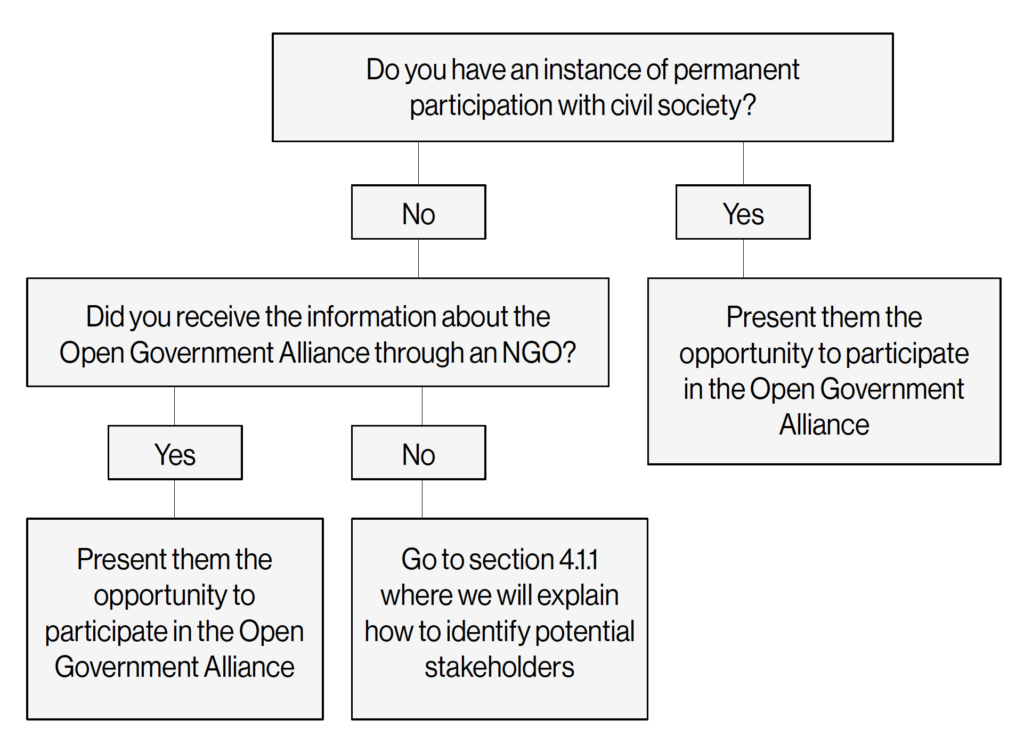Your local government is not a member yet? Any local jurisdiction from a current OGP member country in good standing can apply to join OGP Local. There is no population threshold, nor is there a limit to the number of local members from the same OGP country that can join OGP Local. The important thing is that the application must be made jointly by the local government with at least one non-governmental stakeholder, so the initial impulse to join can come from either sector.
To learn more about the application process, you can go to Chapter 1 of
the OGP Local Handbook.

OGP is a platform for local governments and non-governmental stakeholders to come together to make their governments more open, inclusive and responsive, modeling the values and principles of the Open Government Declaration and processes. It enables members to receive support in the process and improve visibility of innovations made to inspire others.
Open Government is a new paradigm based on the principles of transparency, participation and collaboration that seeks to transform the relationship between citizens and the state after the exhaustion of traditional models of public administration.
For learning more about what Open Government means you can read Section A of The Skeptics Guide.

From the OGP’s perspective, Open Government promise is to do government differently, opening it up by bringing (back) citizens into the design, implementation and monitoring of government. Not just for the principle of it, but most importantly to make government more effective and efficient, less corrupt, more trusted. In short, to make the government deliver better for the people. It is more important than ever that citizen engagement and public participation are enacted properly to provide the necessary impetus and oversight for good governance.
Upon joining OGP, governments work with non-governmental stakeholders to co-create action plans, with concrete commitments across a broad range of issues. This model allows non-governmental stakeholders and direct citizen engagement to play a role in shaping and overseeing governments.
The calls for applications to join OGP Local will be announced by the OGP Support Unit on a periodic basis, at which time the details of the process and timelines will be published.

As the Letter of Support to apply to OGP local has to be signed by the head of the local government or a senior local official with delegated authority, one key aspect is to have the political support not only to be a member of the partnership, but also to promote the process of co-creation of the commitments once accepted in the partnership.
Hence, we recommend organizing a meeting with the local authority that allows you to share what you have learned about open government and how belonging to the partnership could benefit the administration. Some of the benefits of Joining OGP to adopt open Government are:
To find out more about how to make the case for OGP go to OGP Participation and Co-Creation Toolkit.
Also, you can read about OGP´s impact in The Skeptics Guide, to identify more arguments in favor of joining.

The person responsible for coordinating the government’s participation in OGP Local is called the Local Government Point of Contact (POC). Although there is a POC for each local government, that does not mean that they work alone.
To Learn More about the responsibilities of the Local Government Point of Contact (POC) go to OGP Local HandBook.

In fact, many local governments have formed specific work teams or allocated time for colleagues from different areas to get involved. There are also local governments that have generated action plans collaboratively with other administrations. All of the above means that we must come together to unite our purposes. To do this, we recommend organizing a meeting with the institutions or internal offices that are related to open government issues, to invite them to participate in the application.
Objective: The objective of this coordination meeting is to bring together internal allies of the administration or other public institutions to apply to OGP Local and subsequently carry out the process of co-creation of the plan and implement it.
Participants: Public officials from offices related to open government issues – such as those in charge of citizen participation and data – and other public institutions who potentially would like to make a joint application. You can also invite other cross cutting agencies in government that have interest in improving the public administration, such as agencies responsible for improving the public administration, high-level decision makers, people with influence over several agencies, etc.
Expected result: Have an internal open government promoter team.
| Moment | Description | Time |
|---|---|---|
| Connection Dynamic | Activity designed so that people who do not usually work together can meet and connect with the theme of the meeting. The speed dating activity in which participants meet in pairs to discuss a question is a good example. The questions can be: What motivated you to participate? What do you understand about Open Government? or another that you can elaborate. | 15 min |
| Meeting Objectives and Agenda | Present to the audience the objective of the meeting and its agenda. | 10 min |
| OGP Presentation | Support presentation to socialice what Open Government is and its benefits. | 15 min |
Activity: Identification of common challenges | Activity that allows an initial diagnosis regarding the main challenges associated with open government.You can organize it through brainstorming in which first each participant is given individual time to think and write down and then it is shared and categorized. | 40 min |
Activity: Identification of the benefits of Joining OGP Local. | After identifying the common challenges, you can organize a second brainstorming in order to reflect on the benefits of joining OGP Local and how it could help to tackle those common challenges. | 20 min |
| Next Steps | Moment of internal coordination to agree on the next steps | 10 min |
Total | 100 min |

As the application must be made jointly by the local government with at least one non – governmental stakeholder, such as Universities, Social Organizations among others, it is important to identify early partners.
The process of receiving support from non-governmental stakeholders for the application can take different paths, depending on the context of the local government and how the idea of applying to local OGP originated. Here is a flow that can help you find the best range of action.

In the event that the Local Government has a permanent participation instance, you can repeat the coordination method used in point 3.4 to generate an external promoter team.
On the other hand, if you received an invitation to participate in OGP through a non-governmental stakeholder, create a follow-up meeting. A good strategy is to present the results of the internal coordination meeting to you.
If you still do not have contact with non-governmental stakeholders potentially interested in open government, we recommend you go to section 4.1, to identify stakeholders.
Non governmental stakeholders are key actors of the OGP process at the national and local level. They contribute with the technical expertise, human resources, and convening capacity to effectively ensure the OGP principle of co-creation and participation is fulfilled.

Once you have internal and non-governmental stakeholders support, you must send your application to OGP Local. To do this, we recommend that you review the selection criteria and the documentation that you must send to apply.
To Learn More about the application process you can read pages 3-4 of the OGP Local HandBook or reach out to local@opengovpartnership.org.

Constant communication with your internal and external promoter teams is important, especially to keep them abreast of the entire process. If they already received the acceptance letter, share the good news with them. This will serve as a motivator to begin organizing the next steps. Additionally, and as part of the socialization actions, they could begin by publicizing this good news to the general public from the local government.
Some ideas to communicate the good news and next steps are to create a website, write a blog or newsletter, send letters or emails to parties involved, make announcements on the radio or television, create videos, infographics and post on social media.
Dear promoters of Open Government, colleagues and friends:
It is with great pleasure that we inform you that we have been accepted into the Open Government Partnership. This is excellent news that will allow us to strengthen citizen participation in public decision-making.
We want to specially thank you for your contribution in making this possible.
To continue this path we started together, we want to invite you to a meeting with the objective of agreeing on the roadmap to co-create our first action plan on the xx day, from xx to xx hours at (mention location).
We ask that you please confirm your attendance to xx@xx.com
See you soon.

(Local Government) is accepted into the Open Government Partnership.
OGP seeks to promote a way to do government differently, involving citizens into the design, implementation and monitoring up to a number of five commitments that shape an action plan.
The process of co-creation of the first action plan will begin soon, which will allow citizens and non-governmental stakeholders to get involved in the elaboration of commitments to increase transparency, participation and use of data, among other areas.
To stay on top of the progress of co-creation of our first action plan and see how you can get involved, check out the process web page
